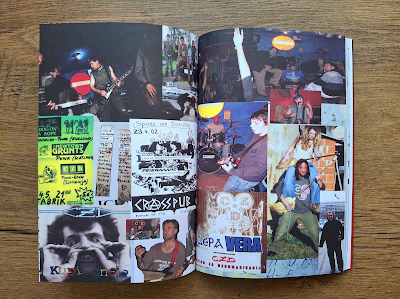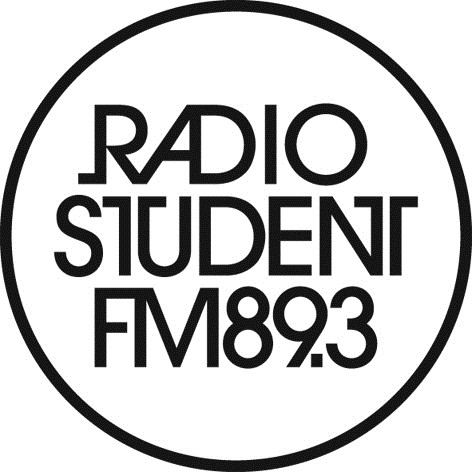CZD ("Center Za Dehumanizacio" or "Center for Dehumanization in English") is a Slovenian alt/punk rock band formed in 1984 in Maribor. The band soon developed its own variation of punk rock music, characterized by a strong leaning towards experimentation. Integrating and adapting various genres including industrial, electropop, a cappella and hardcore punk, CZD are also known for their lyrics and strong stage presence. In addition to music, the group is also active in other artistic fields, having worked and collaborated (as individuals and as a group) in writing, video art, political activism and cultural infrastructure; they have made a significant contribution to the Slovenian cultural scene (especially that of the Northeast) over the past three decades.
Interview with Dušan Hedl/CZD (pt.I)
Mišo/M:
Dušan/D:
M: Hi Dušan, tell us briefly about yourself and what you are doing today? What is your job?
D: My colleagues and I work in the book publishing house Kulturni center Maribor (https://zalozbaknjig.com/) . This publishing house is becoming an increasingly important player inSlovenia's otherwise small book market of 2 million inhabitants. The main book stock isFrontier, which has been in existence for more than 30 years, and another extremely important collection isZnanstvena monografija (Scientific Monograph), which helps young educated people in their careerspath. Kulturni centrum Maribor also has a music publishing house, namely 4 sub-publishers.punk rock and garage rnr, which has been operating since the mid-1980s, Monofonika, which publishesprogressive electronica, mostly recordings of ex-Yugoslav bizarre electronic music (compilations ExYu Electronica), founded in Yugoslavia by the legendary multiperformative artist MarioMarzidovšek and Akord record, which releases ethno, world and pop music, and Classica Slovenica for classical music.
M: You have been working in the cultural field for 40 years, what do you still enjoy?
D: Tell me, who likes to work? But it's easier if you started out and did what you played with in your youth and made a living at it. To survive in the cultural scene, especially independently, as I've always led itindependent organizations, is extremely difficult. The EU is well on its way to destroying independent cultural scene and thus destroy creativity, EU money for cultural activities is only spent by elite people.I've enjoyed it less in recent years as I've had to invest all my time in running a publishing househouse if we wanted to survive, and I have neglected my musical (CZD - Centre for Dehumanization,Punkappella, Kloopotec, Studenstsko delavski rock teater v opposiciji) and art projects (Pop art,paintings, avant-garde collages,... ) and writing for media and book publications. We try to be as in the Maribor Cultural Centre team as professional as possible, which means that for rational investment we offer artists satisfactory publishing services.
M: Slovenia is a relatively small country (a country with half the area and population than Slovakia). How are youdid you discover punk in the 80s? What were your main sources? I was lucky enough to see PANKRTI live in Belgrade at a concert in Kalemegdan in 2010. Which bands were essential for you?
D: Do you think Slovenia has half the population of Slovakia? Yes. Even before punk, I was deeply interested in music, as a primary school pupil I listened to glam rock, then everything from Paco de Lucia to classic rock, electronica and folk music, everything the world market has to offer (from movies, comics, music,....) to be blind to reality. But in the mid-70s I always wished to live in the 50s, when music for the young people was exciting, thrilling, or so I thought, because I didn't know the 60s well then and the hippie movement was too slow for me and the philosophy of drugs never appealed to me. I also a kid from the countryside and the city (Maribor) was a frustrated hippie quasi-philosophically stressed out, positions in the pop culture business were already taken, concreted, positioned... so punk was like an order for a young person to come up with something "peculiar"... I've since I've absorbed everything I can from the media. I used to buy the NME (interestingly, you could buy the NME in Maribor from a street vendor selling newspapers), I read all the music magazines, on Austrian television we could watch, because I live on the border, we saw the records quite quickly seen records by Sex Pistols, Clash, etc.... we were ordering records from London, etc.... then it was just a matter of time before we formed our first bands (Masaker), we started corresponding with other punks all over the world and in the former Yugoslavia. I remember the letters of Satan Panonski ("Why am I in jail?, because of the murder...")...
M: Czech and Slovak bands are represented on the compilation Various - No Border Jam 3. Do you remember how you got in touch with the bands ZÓNA A and JESUS UNDERGROUND BAND?
D: I don't even remember how we met, but it was a big international fanzine correspondence scene. I think it was the early days of the internet. Jesus Underground was a great band in particular, imagine the fantastic name of the band. They played at one of the first No Border Jam festivals, which I organized in Ormoz (together with the Unterhund club). The band Jesus Underground came back to us later and invited us to a festival in Slovakia near Banská Bystrica, a great place on a nearby mountain. At incredible place. CZD, Pridigarji and Delaware played there. Later, the No Border Jam festival moved to the Pekarna cultural centre in Maribor, which we founded right after the occupation of Metelkova in Ljubljana, where we learned how it works. In front of Pekarna occupation, we organized protest concerts in Maribor and Ptuj, where we played underground at Muršićeva. It's interesting how all these places later became sort of pop culture centres. As if they were reacting to underground movements or to protect themselves from them.
M: Were you in contact with Slovak bands, labels in the 90s?
D: Yes, of course, we always exchanged records with some of them...
M: You had an extensive publishing activity. How did you get into it? Was it the lack of interest in you in mainstream media and alternative music in general, or did you want to have more of it in your hands?
D: Both, of course. First, in the late 80s, there was interest in releasing recordings of my band CZD, shortly thereafter, I founded the underground label Front Rock and released quite a lot of top underground Polska malca, Pridigarji, Scuffy Dogs, No Border Jam compilations, which at that time was international compilations and brought incredible music information all over Europe, important was scene from the former Yugoslavia, which needed a lot of help during the war in the 90s, etc. see http://www.ljudmila.org/subkulturni-azil/
Then we started publishing books, first about the punk and underground scene and subcultures in Slovenia and the world. Soon it grew into a literary publishing house with quality Slovenian authors publish. Some have been with us for 35 years, which is incredible, and we are very proud of them and us together. Sometimes writers and musicians don't realize how important it is for a career to publish in the same publishing house because sooner or later you end up with collected works, clear compilations that you can't collect if you wander from one to the other like a butterfly or a prostitute with the "hope" of better conditions. The conditions are governed by a reciprocal relationship between them, and above all the relations are regulated by a positive and sophisticated attitude towards artistic creation, to the final product, to the artistic career, with a whole plan of what to you want to get with the whole plan of what you from your artistic work. If the artwork is just an ego trip, then you are a butterfly.
At Založba knjig (Book Publishing House) we also publish translations into Slovenian, and now also publishing some books in English and German.
M: How many of these books have you published?
D: The catalogue of Založba knjig Kulturni center Maribor currently contains approximately 450 books of all from novels to poetry, children's books, science books, comics, etc., and is still growing, half of which are currently published as e-books. Approximately 100 albums have been published; this catalogue revision will need to be collected soon.

















.jpeg)

